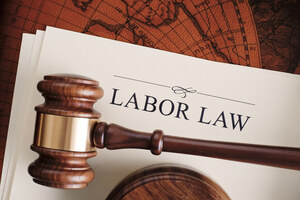LAWSUITS NEWS & LEGAL INFORMATION
New York State Labor Law, Overtime
Were you looking for New York Wrongful Termination lawsuits?
By Anne Wallace
New York labor law lawsuits allege violations of New York state labor laws including overtime pay, minimum wage violations, harassment, wrongful termination and discrimination. The rights of employees in New York are protected by a safety net of federal, state and local laws. The interaction of these laws can be complex, but the basic rule is that local laws may only be more protective of workers than state laws, and state laws may only be more protective than applicable federal laws.
If you feel that your employment rights have been violated, be sure to tell your lawyer about three things:
This is the best way to determine the nature and extent of the possible New York state labor law violations.
New York wage and hour lawsuits allege violations of various wage and hour laws—meaning employees claim they were not paid enough for work being done. In January 2018, Uber Technologies agreed to pay up to $3 million to settle a proposed class-action lawsuit brought on behalf of 2,421 drivers in New York who accused the ride-sharing company of docking excessive fees from their fares.
In some cases, employees are misclassified as administrative and exempt from overtime pay. In other cases, they are misclassified as independent contractors and do not receive minimum wage or other benefits. Some employees claim they are required to work off the clock, even if they should be paid overtime wages. Some employers skirt the edges of the law in multiple ways as was alleged in a 2018 lawsuit involving a Brooklyn carwash.
Wage and hour provisions are covered by the federal Fair Labor Standards Act and the New York Minimum Wage Act, as well as local laws.
All too frequently, New York employees are misclassified as exempt from overtime pay. This means that they are not receiving overtime pay when they should. New York overtime pay is owed when an employee works more than eight hours in one day or more than 40 hours in a week and is given at a rate at one-and-one-half times the regular rate of pay. The issue is that some workers are misclassified as administrative or managerial when they perform the duties of an employee.
To determine whether an employee is eligible for New York overtime pay, a "duties test" can be performed. The "duties test" takes into consideration the actual work being done and not the job title of the worker. To be exempt from overtime, the worker must do work that is mainly administrative, professional or executive in nature. If more than half the worker's time is involved in duties that are non-manual, related to management policies, and involve discretion and judgment, that worker may be exempt from overtime pay. The worker must also receive a salary to be exempt. Simply being given a title that involves the word "administrative" does not automatically exempt an employee from overtime pay.
In addition to the “duties test,” New York also applies a “salary test.” Beginning in 2018, outside of New York City, Nassau, Suffolk and Westchester counties, for example, an employee who makes less than $780 per week would qualify for overtime regardless of her title or the nature of the duties performed.
As with minimum wages, New York City and metropolitan area counties have higher thresholds to reflect the higher cost of living. Those minimums are set to increase on a yearly basis and, within New York City, are different for larger and smaller employers.
Minimum Wage
As of December 31, 2017, the minimum wage throughout New York State is $10.40 an hour. This minimum wage applies to employees in New York State, including most domestic workers and nail salon employees. Certain localities, however, provide for a higher minimum, including New York City ($13.00 for employers with 11 or more employees, $12.00 for employers with fewer) and Long Island and Westchester County ($11.00). The minimum wage will increase every year on December 31 until it reaches $15.00 per hour.
However, some industries make allowances for tips and therefore can set a lower hourly pay. For example, food service workers who earn tips as part of their total compensation may earn less than minimum wage. The minimum wage for tipped workers will ultimately increase to $10.00 per hour.
Wage lawsuits are common in the restaurant industry. Early in 2018, for example, a bartender sought class-action status for a lawsuit in which he claims that he received the lower tipped wage even though approximately 20 percent of his work behind the bar, tasks like cutting lemons or stocking napkins, was not tip-producing.
Paid Family Leave
Beginning in 2018, workers will be eligible for 12 weeks of paid family leave. The time may be used for caring for family members during a serious health condition or to support the worker’s family when a member is called to active military service. Workers must have been employed for six months before becoming eligible to participate.
The paid family leave benefit will take effect in stages, beginning in 2018 with 50 percent of an employee’s average weekly wage, capped at 50 percent of the statewide average weekly wage. The average weekly wage limit will increase to 67 percent by 2021, with a 67 percent cap.
Gratuities
Section 196-d of the New York State Labor Law states that no employer or agent of an employer can demand or accept any part of the gratuities (tips) given to an employee or keep any part of a tip that is meant for an employee. This means that managers are not allowed to take tips from employees where the employer uses the tips as a reason to pay the employee less than minimum wage. However, the law does not define exactly what an "agent" of the employer is, which has resulted in the courts making that distinction through lawsuits filed against employers for forced tip-sharing.
New York Wrongful Termination
 New York is an "at will" employment state, meaning that either the employer or employee can terminate the working relationship at any time for no reason. Despite New York being an "at will" state, there are limits on employers terminating the working relationship. An employee cannot be fired for reasons that violate the law, such as for discriminatory reasons. For example, an employee cannot be fired because of his or her race, age, religion, national origin, sex, sexual identity, sexual orientation, disability, or marital status.
New York is an "at will" employment state, meaning that either the employer or employee can terminate the working relationship at any time for no reason. Despite New York being an "at will" state, there are limits on employers terminating the working relationship. An employee cannot be fired for reasons that violate the law, such as for discriminatory reasons. For example, an employee cannot be fired because of his or her race, age, religion, national origin, sex, sexual identity, sexual orientation, disability, or marital status.
Furthermore, an employee cannot be fired for reasons that violate public policy. This means that an employee cannot be fired for exercising his or her rights, for being a whistleblower, for complaining about working conditions or for taking time for legitimate jury duty.
Finally, an employee cannot be fired if there is a valid contract in place—implied or written—and if the firing violates that contract or violates company policy.
Workers Adjustment and Retraining Notification (WARN) Act
The New York State Workers Adjustment and Retraining Notification Act was enacted to give employees early warning of business closings and mass layoffs. Under WARN, employers must provide 90 days' notice before a plant closing, mass layoff, relocation or other covered reduction in work hours. WARN applies to private employers with 50 or more workers in New York State and covers business closings or layoffs involving 25 or more employees.
The Fair Labor Standards Act (FLSA)
The Fair Labor Standards Act is a federal law regarding employee wages and hours worked, including overtime hours and wages. Under the FLSA, some workers can be exempted from overtime pay. However, those workers must fit the criteria the FLSA sets out for exemption. New York's laws also apply to employment subject to the FLSA. In cases where both the FLSA and state law apply, the law setting the higher standards must be observed.
More information on how the Fair Labor Standards Act applies to overtime can be found here.
Family Medical Leave Act (FMLA)
The Family Medical Leave Act (FMLA) is a federal act that requires that covered employers provide up to 12 weeks of unpaid leave to eligible employees for the following reasons: the birth and care of the employee's newborn child; care for a child after adoption or foster care placement; leave due to a serious health condition that affects the employee's own ability to work; or the need for the employee to care for a spouse, child or parent with a serious health condition.
New York employees are eligible for FMLA coverage if they have worked for a covered employer for at least one year, for 1,250 hours over the previous 12 months (not necessarily consecutive months) and if a minimum of 50 employees are employed by the same employer within 75 miles.
Covered employers are those who employ more than 50 employees within 75 miles of the worksite and have at least 50 employees who work 20 or more work-weeks in the current calendar year or the previous calendar year. Public agencies are covered by the FMLA regardless of the number of employees.
Occupational Safety and Health Act (OSHA)
The Occupational Safety and Health Act is a federal law enacted to ensure that employees work in an environment that is free from recognized hazards. It is part of the United States Code, Title 29, Chapter 15.
Federal laws also protect employees from sexual harassment and discrimination, including race, age, disability and pregnancy discrimination.
Employees who feel their rights have been violated may have the opportunity to bring their complaint before the courts.
Last updated on
If you feel that your employment rights have been violated, be sure to tell your lawyer about three things:
- The geographic location of your job;
- What industry you work in (hospitality, retail, fast food, etc); and
- The approximate number of employees if fewer than 15.
This is the best way to determine the nature and extent of the possible New York state labor law violations.
En Español NUEVA YORK LEY DE EMPLEO
FREE NEW YORK LABOR VIOLATIONS LAWSUIT EVALUATION
Send your New York Labor Violations claim to a lawyer who will review your claim at NO COST or obligation.
GET LEGAL HELP NOW
GET LEGAL HELP NOW
New York Wage and Hour Lawsuits
In some cases, employees are misclassified as administrative and exempt from overtime pay. In other cases, they are misclassified as independent contractors and do not receive minimum wage or other benefits. Some employees claim they are required to work off the clock, even if they should be paid overtime wages. Some employers skirt the edges of the law in multiple ways as was alleged in a 2018 lawsuit involving a Brooklyn carwash.
Wage and hour provisions are covered by the federal Fair Labor Standards Act and the New York Minimum Wage Act, as well as local laws.
New York Overtime Exempt Employees and Mis-classifications
To determine whether an employee is eligible for New York overtime pay, a "duties test" can be performed. The "duties test" takes into consideration the actual work being done and not the job title of the worker. To be exempt from overtime, the worker must do work that is mainly administrative, professional or executive in nature. If more than half the worker's time is involved in duties that are non-manual, related to management policies, and involve discretion and judgment, that worker may be exempt from overtime pay. The worker must also receive a salary to be exempt. Simply being given a title that involves the word "administrative" does not automatically exempt an employee from overtime pay.
In addition to the “duties test,” New York also applies a “salary test.” Beginning in 2018, outside of New York City, Nassau, Suffolk and Westchester counties, for example, an employee who makes less than $780 per week would qualify for overtime regardless of her title or the nature of the duties performed.
As with minimum wages, New York City and metropolitan area counties have higher thresholds to reflect the higher cost of living. Those minimums are set to increase on a yearly basis and, within New York City, are different for larger and smaller employers.
New York Employment and Labor Laws
As of December 31, 2017, the minimum wage throughout New York State is $10.40 an hour. This minimum wage applies to employees in New York State, including most domestic workers and nail salon employees. Certain localities, however, provide for a higher minimum, including New York City ($13.00 for employers with 11 or more employees, $12.00 for employers with fewer) and Long Island and Westchester County ($11.00). The minimum wage will increase every year on December 31 until it reaches $15.00 per hour.
However, some industries make allowances for tips and therefore can set a lower hourly pay. For example, food service workers who earn tips as part of their total compensation may earn less than minimum wage. The minimum wage for tipped workers will ultimately increase to $10.00 per hour.
Wage lawsuits are common in the restaurant industry. Early in 2018, for example, a bartender sought class-action status for a lawsuit in which he claims that he received the lower tipped wage even though approximately 20 percent of his work behind the bar, tasks like cutting lemons or stocking napkins, was not tip-producing.
Paid Family Leave
Beginning in 2018, workers will be eligible for 12 weeks of paid family leave. The time may be used for caring for family members during a serious health condition or to support the worker’s family when a member is called to active military service. Workers must have been employed for six months before becoming eligible to participate.
The paid family leave benefit will take effect in stages, beginning in 2018 with 50 percent of an employee’s average weekly wage, capped at 50 percent of the statewide average weekly wage. The average weekly wage limit will increase to 67 percent by 2021, with a 67 percent cap.
Gratuities
Section 196-d of the New York State Labor Law states that no employer or agent of an employer can demand or accept any part of the gratuities (tips) given to an employee or keep any part of a tip that is meant for an employee. This means that managers are not allowed to take tips from employees where the employer uses the tips as a reason to pay the employee less than minimum wage. However, the law does not define exactly what an "agent" of the employer is, which has resulted in the courts making that distinction through lawsuits filed against employers for forced tip-sharing.
New York Wrongful Termination
 New York is an "at will" employment state, meaning that either the employer or employee can terminate the working relationship at any time for no reason. Despite New York being an "at will" state, there are limits on employers terminating the working relationship. An employee cannot be fired for reasons that violate the law, such as for discriminatory reasons. For example, an employee cannot be fired because of his or her race, age, religion, national origin, sex, sexual identity, sexual orientation, disability, or marital status.
New York is an "at will" employment state, meaning that either the employer or employee can terminate the working relationship at any time for no reason. Despite New York being an "at will" state, there are limits on employers terminating the working relationship. An employee cannot be fired for reasons that violate the law, such as for discriminatory reasons. For example, an employee cannot be fired because of his or her race, age, religion, national origin, sex, sexual identity, sexual orientation, disability, or marital status.Furthermore, an employee cannot be fired for reasons that violate public policy. This means that an employee cannot be fired for exercising his or her rights, for being a whistleblower, for complaining about working conditions or for taking time for legitimate jury duty.
Finally, an employee cannot be fired if there is a valid contract in place—implied or written—and if the firing violates that contract or violates company policy.
Workers Adjustment and Retraining Notification (WARN) Act
The New York State Workers Adjustment and Retraining Notification Act was enacted to give employees early warning of business closings and mass layoffs. Under WARN, employers must provide 90 days' notice before a plant closing, mass layoff, relocation or other covered reduction in work hours. WARN applies to private employers with 50 or more workers in New York State and covers business closings or layoffs involving 25 or more employees.
The Fair Labor Standards Act (FLSA)
The Fair Labor Standards Act is a federal law regarding employee wages and hours worked, including overtime hours and wages. Under the FLSA, some workers can be exempted from overtime pay. However, those workers must fit the criteria the FLSA sets out for exemption. New York's laws also apply to employment subject to the FLSA. In cases where both the FLSA and state law apply, the law setting the higher standards must be observed.
More information on how the Fair Labor Standards Act applies to overtime can be found here.
Family Medical Leave Act (FMLA)
The Family Medical Leave Act (FMLA) is a federal act that requires that covered employers provide up to 12 weeks of unpaid leave to eligible employees for the following reasons: the birth and care of the employee's newborn child; care for a child after adoption or foster care placement; leave due to a serious health condition that affects the employee's own ability to work; or the need for the employee to care for a spouse, child or parent with a serious health condition.
New York employees are eligible for FMLA coverage if they have worked for a covered employer for at least one year, for 1,250 hours over the previous 12 months (not necessarily consecutive months) and if a minimum of 50 employees are employed by the same employer within 75 miles.
Covered employers are those who employ more than 50 employees within 75 miles of the worksite and have at least 50 employees who work 20 or more work-weeks in the current calendar year or the previous calendar year. Public agencies are covered by the FMLA regardless of the number of employees.
Occupational Safety and Health Act (OSHA)
The Occupational Safety and Health Act is a federal law enacted to ensure that employees work in an environment that is free from recognized hazards. It is part of the United States Code, Title 29, Chapter 15.
Federal laws also protect employees from sexual harassment and discrimination, including race, age, disability and pregnancy discrimination.
Employees who feel their rights have been violated may have the opportunity to bring their complaint before the courts.
New York Employment Legal Help
If you are employed in the State of New York and feel that your employer or a co-worker has violated an employment law, you may qualify for damages or remedies that may be awarded in a possible lawsuit. Please click the link below to submit your complaint.Last updated on
NEW YORK LABOR VIOLATIONS LEGAL ARTICLES AND INTERVIEWS
NYC Workers Can Sue for Safe and Sick Leave Violations

IT Workers Settle New York Labor Lawsuit with Citigroup

Papa John’s Franchisee Hit with $2 Million New York Labor Law Judgment


May 6, 2024
Earlier this year, New York City enacted a law that amends the city's Earned Safe and Sick Time Act (ESSTA) from 2014. Under Int. 0563-2022, “any person" has a private right of action to file New York lawsuits in court within two years of learning of an alleged violation. The law took effect in March, 2024. READ MORE
IT Workers Settle New York Labor Lawsuit with Citigroup

January 15, 2017
New York, NY: A New York overtime lawsuit that did not succeed as a class action nonetheless will culminate in a settlement $325,000, making it a happy new year for 18 plaintiffs in the New York employer lawsuit against Citigroup Inc. READ MORE
Papa John’s Franchisee Hit with $2 Million New York Labor Law Judgment

March 13, 2015
A New York judge and the Attorney General of the state have both signaled through their actions that New York labor law will not be allowed to flounder at the hands of employers who are alleged to play unfairly in the employment sandbox. To that end, a Papa John’s franchisee has been hit with a $2 million judgment for allegedly underpaying employees. READ MORE
READ MORE Employment Settlements and Legal News

READER COMMENTS
Rose Garcia
on
My health is not the greatest, but they don't want to listen to my requests of working less hours
I get a salary and they don't want me to punch in or out
Also my name is Rose but the new manager told me i look colombian so she is calling Maria, she said her mother is Rose and I don't look like Rose
Rose
John Scheidling
on
I had PTO time left . I asked for more time off after the death of my Mother. I had been feeling pushed to work in unsafe driving conditions. I had experienced spiteful actions of the customer.
Blocked entrance ways, loading doors and docks. There were instances of truck keys being removed mysteriously. Our work vehicles had been sabatoged. Cut wires, missing items.
I was hurt loading because of negligent practices.
New York
on
New York
on
New York
on
New York
on